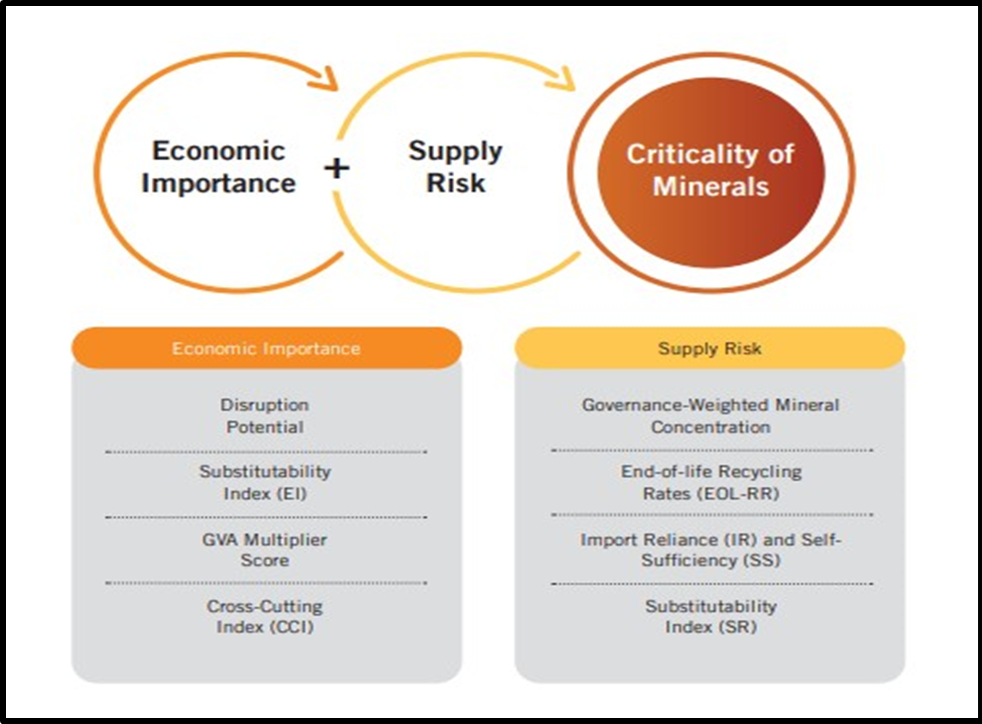CRITICAL MINERAL MISSION IN INDIA
SYLLABUS:
GS 2:
- Economic Development
- Mineral Exploration
Focus:
India’s Critical Mineral Mission announced in the Union Budget 2024 – 25. This Mission has put Africa at the centre of India’s mineral sourcing policy. Holding 30% of global reserves, Africa has a great potential for cooperation with India. This cooperation focuses on Africa’s transition to green energy resources and demand in critical minerals.
Source:medium
Background and Context:
- Union Budget 2024-25: The Union Finance Minister of India, announced the creation of Critical Mineral Mission for sourcing mineral resources beneficial to the nation’s economy.
- Mission Objectives: Emphasise the development of the new capacities, the recycling of critical minerals and incentivising the acquisition of overseas assets.
- Legal Framework: The Mines and Minerals (Development and Regulation) Act of 1957 was amended in 2023 to remove six minerals from the atomic list and open it for exploration for private sectors.
- International Collaboration: KABIL ( Khanij Bidesh India Limited), which was set up in 2019, will help India interact with mineral exporting countries .In particular, the country signed an MoU with Argentina for lithium exploration.
- Domestic Gaps: India should have the ability to manufacture critical minerals, acquire highly skilled workers and technology to explore these minerals.
|
What are Critical Mission?
Importance of Critical Mineral Mission:
|
Africa’s role in India’s supplu chain:
- Africa’s Critical Reserves: Africa holds 30% of the global critical mineral resources, which are very crucial for any country’s critical minerals mission, including that of India.
- India-Africa Ties: India has strong political , economic and trade relations with deep historical and cultural affinity to Africa with a growing diaspora of three million.
- Trade and Investments: The bilateral trade between India and Africa has risen to $98 billion in 2022-23 with $43 billion in mining industries and large scale public sector investments on energy assets.
- Energy Partnerships: India has stepped up its crude oil imports from Africa by a third to 34 million tonnes annually, satisfying 15% of its consumption; there is additional increase of natural gas and mineral imports.
- African Policy Shifts: Most African countries are departing from exporting raw materials by adopting value addition strategies such as; Tanzania’s Multi-Metal Processing Facility and Zimbabwe’s Export Bans.
China’s supremacy in the sector:
- China’s Early Moves: The nature of Chinese acquisitions particularly of critical minerals have given them near monopolistic control over the global value chain, which is an economic and security risk to India.
- Processing Capabilities: Beijing has well established processing & manufacturing industries hence a strategic position in global value chains.
- Cobalt Mining in Congo: Cobalt is mainly mined in the Democratic Republic of Congo where currently major Chinese mining firms have signed a $7 billion minerals-for-infrastructure agreement.
- Indian Concerns: Chinese dominance in these minerals diametrically threatens to challenge India’s access to these minerals, implying the need to diversify the supply base.
- Competitive Geopolitics: The increased political rivalry in Africa calls for the development of other sources in sourcing of critical minerals by India.
Opportunities for India-Africa Collaboration
- Indian Infrastructure Projects: Some of the completed infrastructure projects by India in Africa includes; hospitals in Tanzania, Transmission lines in Tunisia and Railways in Ghana in 43 African countries.
- Strategic Projects: India can partner with the African nations to seek out the logical mineral projects, and establish infrastructure requisite to mining.
- Capacity Building: India has signed MoUs with Zambia and Zimbabwe for geological mapping and capacity building in the mineral sector, utilizing programs like the Indian Technical and Economic Cooperation.
- Value Addition Focus: India’s collaboration with Africa should prioritize value addition to minerals, aligning with African goals of industrializing their mineral sectors.
Way Forward for India’s Critical Mineral Mission:
- Responsible Practices: India’s Critical Mineral Mission must ensure responsible and sustainable mining practices to support a not-so-green energy transition.
- Training Workforce: Upskilling both Indian and African workforces is crucial, using mechanisms like the Indian Technical and Economic Cooperation to develop expertise in critical minerals.
- Partnership Leverage: India can leverage its long-standing relationships and expertise to support African governments in value addition, boosting both economies.
- Strategic Alignment: Aligning with Africa’s green mineral strategy will provide India with a reliable and ethical source of critical minerals.
- Balanced Approach: India must balance its need for critical minerals with fostering development in Africa, ensuring mutual growth and reducing dependence on China.
Conclusion:
Africa’s mineral wealth, combined with India’s technological and infrastructural capabilities, provides a unique opportunity for mutually beneficial partnerships. Thus, India must focus on sustainable mining practices, technology-driven exploration, and value addition. The goal is to create resilient supply chains and reduce dependency on geopolitical rivals like China.
Source:The Hindu
Mains Practice Question
Examine the potential of India-Africa collaboration. How can this partnership ensure a sustainable supply of critical minerals for India? How can India leverage its technological expertise and infrastructure projects to secure these resources while promoting value addition in Africa?




